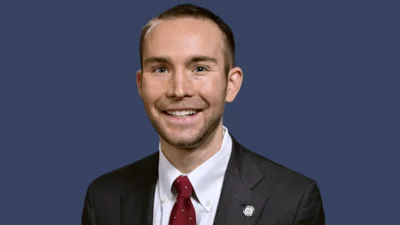Proposal 2 could give more than 33,000 prison inmates statewide the ability to vote. | Pexels/Edmond Dantès
Proposal 2 could give more than 33,000 prison inmates statewide the ability to vote. | Pexels/Edmond Dantès
As Promote the Vote continues its campaign for Proposal 2, unsettling revelations indicate the ballot language may open the doors for criminals currently serving time to be able to vote. Katie MacFarland, Mom’s for Liberty Oakland County Membership Chair for Michigan, recently slammed Promote the Vote in a statement, warning that Proposal 2 would amend state law to allow criminals to vote and goes against the state's values.
Proposal 2 could give more than 33,000 prison inmates statewide the ability to vote, according to data from World Population Review.
"Proposal 2 goes against Michigan values," MacFarland said. "We oppose this proposal because it could make it easier for criminals to vote, and harder for Michiganders to trust our elections."
The proposal could also permit more Michigan prisoners to vote than the total amount of voters who decided the 2016 presidential election. Donald Trump received 2,279,543 votes while Hillary Clinton had 2,268,839 votes, a difference of 10,704 votes, according to 270towin.com.
Article 2, Section 2 of the Michigan Constitution, which concerns the election process with regards to those who are mentally incompetent or imprisoned, states that "the legislature may by law exclude persons from voting because of mental incompetence or commitment to a jail or penal institution."
Article 2, Section 4(a) of the Michigan Constitution, which concerns the place and manner of elections, currently states: Every citizen of the United States who is an elector qualified to vote in Michigan shall have the following rights: (a) The right, once registered, to vote a secret ballot in all elections.
The Promote My Vote Petition would amend Article 2, Section 4(a) to state, in pertinent part: "(1) Every citizen of the United States who is an elector qualified to vote in Michigan shall have the following rights: (a) THE FUNDAMENTAL RIGHT TO VOTE, INCLUDING BUT NOT LIMITED TO the right, once registered, to vote a secret ballot in all elections. NO PERSON SHALL: (1) ENACT OR USE ANY LAW, RULE, REGULATION, QUALIFICATION, PREREQUISITE, STANDARD, PRACTICE, OR PROCEDURE; (2) ENGAGE IN ANY HARASSING, THREATENING, OR INTIMIDATING CONDUCT; OR (3) USE ANY MEANS WHATSOEVER, ANY OF WHICH HAS THE INTENT OR EFFECT OF DENYING, ABRIDGING, INTERFERING WITH, OR UNREASONABLY BURDENING THE FUNDAMENTAL RIGHT TO VOTE."
Michigan Supreme Court Justice Brian Zahra argues the language of Proposal 2 does not abrogate the current language in the Michigan Constitution. He states, "Article 2, Section 1 expressly acknowledges that who is qualified to be an elector in Michigan can be limited by other provisions of the Constitution, and Article 2, Section 2 expressly grants the Legislature permissive authority to enact statutes imposing such limitations as to mentally incompetent or incarcerated individuals."


 Alerts Sign-up
Alerts Sign-up